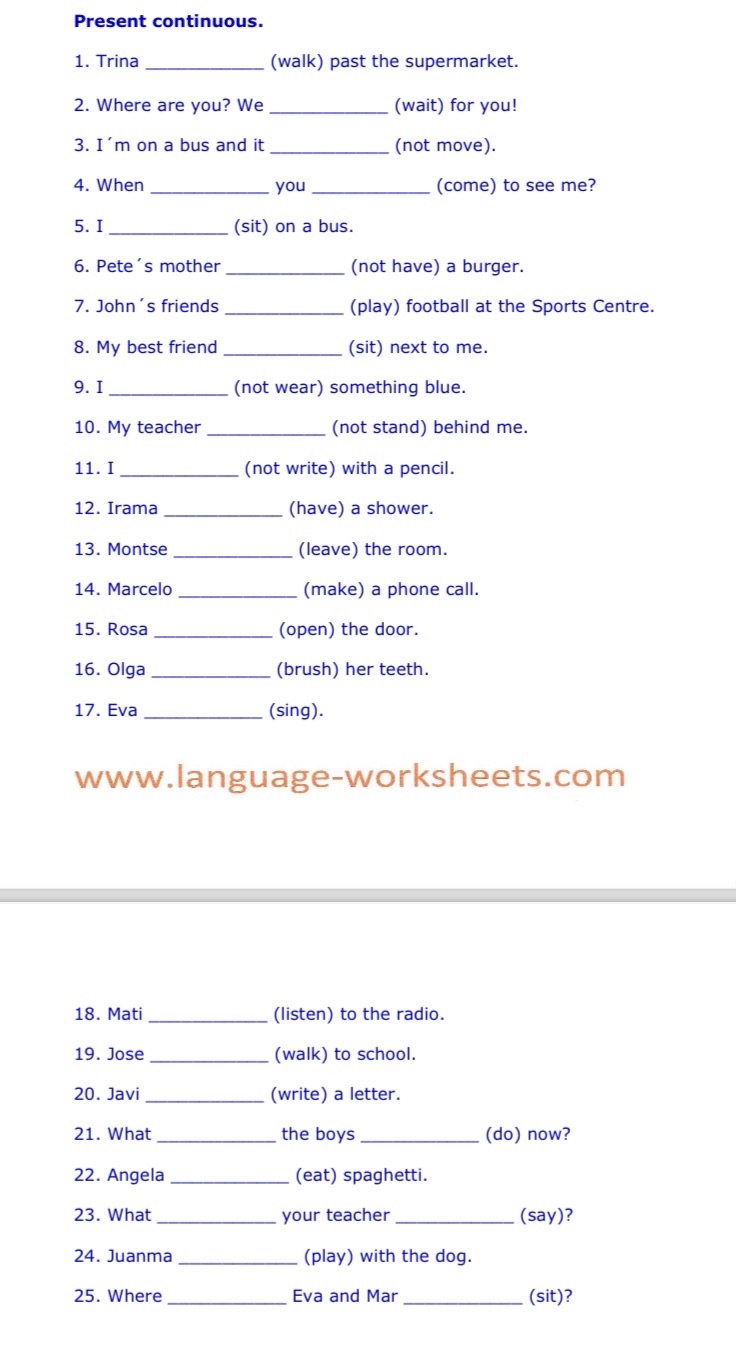
Вопрос:
Present continuous. 1. Trina _______ (walk) past the supermarket. 2. Where are you? We _______ (wait) for you! 3. I'm on a bus and it _______ (not move). 4. When _______ you _______ (come) to see me? 5. I _______ (sit) on a bus. 6. Pete's mother _______ (not have) a burger. 7. John's friends _______ (play) football at the Sports Centre. 8. My best friend _______ (sit) next to me. 9. I _______ (not wear) something blue. 10. My teacher _______ (not stand) behind me. 11. I _______ (not write) with a pencil. 12. Irama _______ (have) a shower. 13. Montse _______ (leave) the room. 14. Marcelo _______ (make) a phone call. 15. Rosa _______ (open) the door. 16. Olga _______ (brush) her teeth. 17. Eva _______ (sing). 18. Mati _______ (listen) to the radio. 19. Jose _______ (walk) to school. 20. Javi _______ (write) a letter. 21. What _______ the boys _______ (do) now? 22. Angela _______ (eat) spaghetti. 23. What _______ your teacher _______ (say)? 24. Juanma _______ (play) with the dog. 25. Where _______ Eva and Mar _______ (sit)?
Ответ:
[{"question": "1. Trina _______ (walk) past the supermarket.", "answer": "Trina is walking past the supermarket."}, {"question": "2. Where are you? We _______ (wait) for you!", "answer": "Where are you? We are waiting for you!"}, {"question": "3. I'm on a bus and it _______ (not move).", "answer": "I'm on a bus and it isn't moving."}, {"question": "4. When _______ you _______ (come) to see me?", "answer": "When are you coming to see me?"}, {"question": "5. I _______ (sit) on a bus.", "answer": "I am sitting on a bus."}, {"question": "6. Pete's mother _______ (not have) a burger.", "answer": "Pete's mother isn't having a burger."}, {"question": "7. John's friends _______ (play) football at the Sports Centre.", "answer": "John's friends are playing football at the Sports Centre."}, {"question": "8. My best friend _______ (sit) next to me.", "answer": "My best friend is sitting next to me."}, {"question": "9. I _______ (not wear) something blue.", "answer": "I am not wearing something blue."}, {"question": "10. My teacher _______ (not stand) behind me.", "answer": "My teacher isn't standing behind me."}, {"question": "11. I _______ (not write) with a pencil.", "answer": "I am not writing with a pencil."}, {"question": "12. Irama _______ (have) a shower.", "answer": "Irama is having a shower."}, {"question": "13. Montse _______ (leave) the room.", "answer": "Montse is leaving the room."}, {"question": "14. Marcelo _______ (make) a phone call.", "answer": "Marcelo is making a phone call."}, {"question": "15. Rosa _______ (open) the door.", "answer": "Rosa is opening the door."}, {"question": "16. Olga _______ (brush) her teeth.", "answer": "Olga is brushing her teeth."}, {"question": "17. Eva _______ (sing).", "answer": "Eva is singing."}, {"question": "18. Mati _______ (listen) to the radio.", "answer": "Mati is listening to the radio."}, {"question": "19. Jose _______ (walk) to school.", "answer": "Jose is walking to school."}, {"question": "20. Javi _______ (write) a letter.", "answer": "Javi is writing a letter."}, {"question": "21. What _______ the boys _______ (do) now?", "answer": "What are the boys doing now?"}, {"question": "22. Angela _______ (eat) spaghetti.", "answer": "Angela is eating spaghetti."}, {"question": "23. What _______ your teacher _______ (say)?", "answer": "What is your teacher saying?"}, {"question": "24. Juanma _______ (play) with the dog.", "answer": "Juanma is playing with the dog."}, {"question": "25. Where _______ Eva and Mar _______ (sit)?", "answer": "Where are Eva and Mar sitting?"}]
В этих предложениях требуется использовать Present Continuous (настоящее длительное время). Оно используется для описания действий, происходящих в момент речи или в текущий период времени. Форма Present Continuous образуется с помощью вспомогательного глагола to be (am, is, are) и смыслового глагола с окончанием -ing.
* is используется с единственным числом (he, she, it, имя существительное в единственном числе)
* are используется с множественным числом (you, we, they, имена существительные во множественном числе)
* am используется только с местоимением I
Если в предложении есть отрицание, добавляем not после вспомогательного глагола (is not = isn't, are not = aren't, am not).